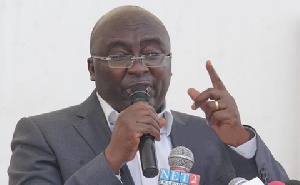Faced with deepening economic malaise, most Ghanaians aren’t easily impressed these days, and whether Dr Mahamudu Bawumia, NPP’s presidential running mate, was right or wrong, he provided an outlet for the venting of people’s frustrations.
In his recent public lecture, Dr Bawumia launched a major destabilization campaign which government deems as one orchestrated to cause economic hopelessness.
He stated that the past eight years have been worse than any period since 2001 and that almost every single economic indicator proves it.
“Under the eight years of the NPP government, from 2001 – 2008, taxes and loans amounted to GH20 billion. In contrast, taxes, oil revenue and loans alone over the eight-year period of 2009 – 2016 would amount to some GH 248 billion,” Dr Bawumia said.
“Since 2011 however, real GDP growth has declined steadily and drastically to 3.9 percent in 2015. The growth rate Ghana attained in the year 2000,” he said.
The astute economist, who has an eloquent way of delivering his catchy economic sermon, believes that Ghana’s strategy for growth over the past years has favoured consumption over investment.
At the core of his views is the belief that Ghana’s economic strategy is mostly insular and offers no priority to businesses to grow.
Yes, Dr Bawumia maybe seemingly clueless of – or oblivious to – the proper economic indicators or the forces driving the economy but the fact is, government’s effort has been overshadowed in recent times by the austere measures it introduced.
Over the past year, there has been growing concern over the economy, and it is particularly troubling that the underlying causes of our tumbling economy show little signs of easing.
Even if Bawumia made a wrong presentation, we could not doubt that graduate unemployment, high taxes, government borrowing, issues surrounding EUROBOND, inflation, a depreciating cedi and lack of diversification, are worrying trends for the ordinary Ghanaian.
A deepening economic anxiety is hardly going to be good news. Economic trouble in the mould of what is currently being experienced by Ghanaians would be worrying even in good political circumstances.
When the people see no one ready to undertake those economic reforms that might place the country on a higher economic growth trajectory, they would easily sway to any voice, be it right or wrong.
And it is normal for the people to want to see someone else committed to facing up to the country’s formidable economic problems.
We need to accept that our major vulnerability at home, has been with monetary and fiscal policies. High inflation caused a consistent preservation of monetary policy rate at 26 percent, causing the jump in interest rates and pushing banks not to take a risk to offer loans to private businesses.
Dr Bawumia may have been harsh about the state of the economy since part of Ghana’s economic slowdown had to do with external factors beyond government’s control like fluctuating global prices of crude oil and gold, as well as bad weather for cocoa production.
The government can blame the huge borrowing splurge on the global recession. There has been global financial crisis which caused deficit to rise.
Government may also be dealing with high deficit because it is building more schools, hospitals and roads etc. You may not agree with that, but let us accept government has done its outmost best to rebuild schools in our country; there have been hospitals that have been rebuilt and there are projects that have been built that couldn’t have happened under any government.
Yet, as the cedi keeps depreciating and inflation as well as unemployment badly tick upwards, with Ghanaians feeling the effect, government would widely be perceived as having lost control of the economy. Such factors are reasons anything Bawumia says would be held up by a pedestrian economics listener.
He (Bawumia) has preyed on the hardships of the people to convince the public that his government will cut down current taxes hurting businesses.
He has tried to convince Ghanaians that millions of taxpayers’ monies are being squandered whilst savings could be made to enrich the economy; he believes government has been on a spending spree on projects at inflated rates, leaving the economy dangerously exposed.
No one can claim to be a master of economics but we also have to agree, more or less, with Bawumia’s assertion. The blows from his lecture made front-page news and hit the government where it hurts – economic credibility.
Overlooking the politics of his lecture lies a genuine question – has the government not said Ghanaians should endure the pain but would put money in their pockets in 2017?
Since there are signs of weaknesses in the economy, it would make it harder for anyone to totally disagree with Dr Bawumia’s argument. Therefore, Dr Mahamudu Bawumia has only exploited the economy’s weaknesses.
Business News of Thursday, 15 September 2016
Source: B&FT

















